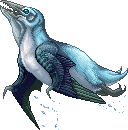Viewing mug2Q

Father: Unknown
Unknown Pedigree
Hardiness: 2
Appearance: 3
Emerged: 3:42 25.10.2021
Matured: 3:56 27.10.2021
Like their flight-capable cousins, Terura Fisistos are found in rocky cliffside habitats near the ocean, though they stay in the lower reaches. Their somewhat flexible wings bear claws used for climbing in areas that are slightly too steep for walking. Bony “teeth” line their beak; the front ones are sharper and aid in catching fish, while those in the back are ideally shaped for cracking crustacean shells. A deep throat pouch provides space to hold multiple catches, allowing Terura Fisistos to carry more prey during one hunt. Rather territorial and aggressive, Terura Fisistos tend to be solitary outside of their brief breeding season. Mates are chosen each year, and if a suitable mate cannot be found, they will seek one out elsewhere, sometimes even climbing to the nesting grounds of a Frida Fisisto group. If a pair is infertile or loses their offspring, they will kidnap the young of other birds to raise as their own.
The creatures that dwell in this rather desolate world still display some diversity in appearance, eating habits, and social behavior. Whether they have fur or feathers, skin or scales, their unique genetic makeup allows for a variety of colors and markings within each species. Despite limitations in food sources, herbivores, omnivores, and carnivores are all present in the food chain, and each species requires specialized care within a laboratory. Although the artificial setting of housing units and breeding pods precludes most opportunities to study true interspecific behavior, the interactions within and between species has been studied extensively in the wilderness by scientists daring enough to venture beyond the outpost’s walls.
